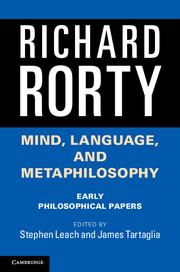Book contents
- Frontmatter
- Contents
- Foreword
- Acknowledgments
- Introduction
- 1 Pragmatism, categories, and language
- 2 The limits of reductionism
- 3 Realism, categories, and the “linguistic turn”
- 4 The subjectivist principle and the linguistic turn
- 5 Empiricism, extensionalism, and reductionism
- 6 Mind-body identity, privacy, and categories
- 7 Do analysts and metaphysicians disagree?
- 8 Incorrigibility as the mark of the mental
- 9 Wittgenstein, privileged access, and incommunicability
- 10 In defense of eliminative materialism
- 11 Cartesian epistemology and changes in ontology
- 12 Strawson’s objectivity argument
- 13 Verificationism and transcendental arguments
- 14 Indeterminacy of translation and of truth
- 15 Dennett on awareness
- 16 Functionalism, machines, and incorrigibility
- Index of names
- References
15 - Dennett on awareness
Published online by Cambridge University Press: 05 June 2014
- Frontmatter
- Contents
- Foreword
- Acknowledgments
- Introduction
- 1 Pragmatism, categories, and language
- 2 The limits of reductionism
- 3 Realism, categories, and the “linguistic turn”
- 4 The subjectivist principle and the linguistic turn
- 5 Empiricism, extensionalism, and reductionism
- 6 Mind-body identity, privacy, and categories
- 7 Do analysts and metaphysicians disagree?
- 8 Incorrigibility as the mark of the mental
- 9 Wittgenstein, privileged access, and incommunicability
- 10 In defense of eliminative materialism
- 11 Cartesian epistemology and changes in ontology
- 12 Strawson’s objectivity argument
- 13 Verificationism and transcendental arguments
- 14 Indeterminacy of translation and of truth
- 15 Dennett on awareness
- 16 Functionalism, machines, and incorrigibility
- Index of names
- References
Summary
D. C. Dennett’s Content and Consciousness is an extraordinarily interesting and original book, and one which will raise the level of current discussion in the philosophy of mind. In this note, however, I should like to criticize one central thesis of the book – that puzzles in the philosophy of mind, and notably those about incorrigible knowledge, can only be cleared up by “an analysis of phenomena at the sub-personal level.” This thesis seems to me dead wrong, and I hope to show, by an analysis of what Dennett says about direct awareness and about incorrigibility, that the revival of Putnam’s notion of “functional state” (on which Dennett depends heavily in his defense of the thesis) is not a profitable strategy.
Dennett’s thesis is, roughly, that only by opening up the person (who has been treated as a sealed “black box” in traditional philosophy of mind) and saying something about his internal “functional organization” can we make the distinctions we need. I want to begin to cast doubt on this by taking up what Dennett says about the need to distinguish two senses of awareness. He regards such a distinction as the beginning of wisdom in this area of philosophy, and I think he is right. But I also think he makes the distinction in the wrong way.
- Type
- Chapter
- Information
- Mind, Language, and MetaphilosophyEarly Philosophical Papers, pp. 290 - 298Publisher: Cambridge University PressPrint publication year: 2014
References
- 2
- Cited by



